新概念英语第3册第19课
- 格式:doc
- 大小:66.50 KB
- 文档页数:8
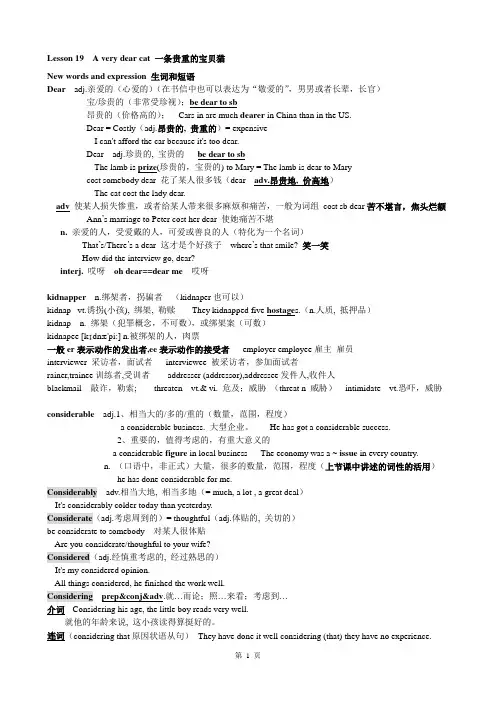
Lesson 19 A very dear cat 一条贵重的宝贝猫New words and expression 生词和短语Dear adj.亲爱的(心爱的)(在书信中也可以表达为“敬爱的”,男男或者长辈,长官)宝/珍贵的(非常受珍视);be dear to sb昂贵的(价格高的);Cars in are much dearer in China than in the US.Dear = Costly(adj.昂贵的, 贵重的)= expensive-- I can't afford the car because it's too dear.Dear adj.珍贵的, 宝贵的be dear to sb-- The lamb is prize(珍贵的,宝贵的) to Mary = The lamb is dear to Marycost somebody dear 花了某人很多钱(dear adv.昂贵地, 价高地)-- The cat cost the lady dear.adv使某人损失惨重,或者给某人带来很多麻烦和痛苦,一般为词组cost sb dear苦不堪言,焦头烂额Ann’s marriage to Peter cost her dear 使她痛苦不堪n.亲爱的人,受爱戴的人,可爱或善良的人(特化为一个名词)That’s/There’s a dear 这才是个好孩子where’s that smile? 笑一笑How did the interview go, dear?interj.哎呀oh dear==dear me哎呀kidnapper n.绑架者,拐骗者(kidnaper也可以)kidnap vt.诱拐(小孩), 绑架, 勒赎-- They kidnapped five hostage s.(n.人质, 抵押品)kidnap n. 绑架(犯罪概念,不可数),或绑架案(可数)kidnapee [kɪdnæ'pi:] n.被绑架的人,肉票一般er表示动作的发出者,ee表示动作的接受者employer employee雇主雇员interviewer 采访者,面试者interviewee 被采访者,参加面试者rainer,trainee训练者,受训者addresser (addressor),addressee发件人,收件人blackmail 敲诈,勒索; threaten vt.& vi. 危及;威胁(threat n 威胁)intimidate vt.恐吓,威胁considerable adj.1、相当大的/多的/重的(数量,范围,程度)-- a considerable business. 大型企业。

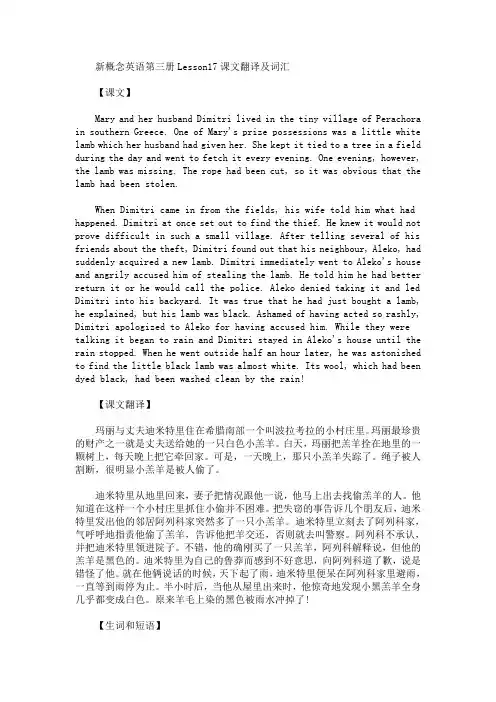
新概念英语第三册Lesson17课文翻译及词汇【课文】Mary and her husband Dimitri lived in the tiny village of Perachora in southern Greece. One of Mary's prize possessions was a little white lamb which her husband had given her. She kept it tied to a tree in a field during the day and went to fetch it every evening. One evening, however, the lamb was missing. The rope had been cut, so it was obvious that the lamb had been stolen.When Dimitri came in from the fields, his wife told him what had happened. Dimitri at once set out to find the thief. He knew it would not prove difficult in such a small village. After telling several of his friends about the theft, Dimitri found out that his neighbour, Aleko, had suddenly acquired a new lamb. Dimitri immediately went to Aleko's house and angrily accused him of stealing the lamb. He told him he had better return it or he would call the police. Aleko denied taking it and led Dimitri into his backyard. It was true that he had just bought a lamb, he explained, but his lamb was black. Ashamed of having acted so rashly, Dimitri apologized to Aleko for having accused him. While they were talking it began to rain and Dimitri stayed in Aleko's house until the rain stopped. When he went outside half an hour later, he was astonished to find the little black lamb was almost white. Its wool, which had been dyed black, had been washed clean by the rain!【课文翻译】玛丽与丈夫迪米特里住在希腊南部一个叫波拉考拉的小村庄里。

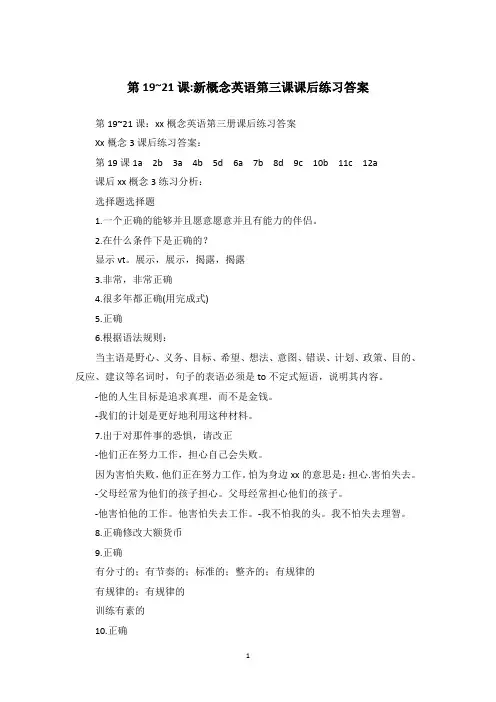
第19~21课:新概念英语第三课课后练习答案第19~21课:xx概念英语第三册课后练习答案Xx概念3课后练习答案:第19课1a 2b 3a 4b 5d 6a 7b 8d 9c 10b 11c 12a课后xx概念3练习分析:选择题选择题1.一个正确的能够并且愿意愿意并且有能力的伴侣。
2.在什么条件下是正确的?显示vt。
展示,展示,揭露,揭露3.非常,非常正确4.很多年都正确(用完成式)5.正确6.根据语法规则:当主语是野心、义务、目标、希望、想法、意图、错误、计划、政策、目的、反应、建议等名词时,句子的表语必须是to不定式短语,说明其内容。
-他的人生目标是追求真理,而不是金钱。
-我们的计划是更好地利用这种材料。
7.出于对那件事的恐惧,请改正-他们正在努力工作,担心自己会失败。
因为害怕失败,他们正在努力工作。
怕为身边xx的意思是:担心.害怕失去。
-父母经常为他们的孩子担心。
父母经常担心他们的孩子。
-他害怕他的工作。
他害怕失去工作。
-我不怕我的头。
我不怕失去理智。
8.正确修改大额货币9.正确有分寸的;有节奏的;标准的;整齐的;有规律的有规律的;有规律的训练有素的10.正确去散步。
-小跑、骑马、疾走、忙里忙外(乡村)弄、弄、弄-我要沿着小路小跑。
我正沿着小巷小跑。
1.果然不出所料。
事实上,事实上12.正确、健康、理智的人Xx概念3课后练习答案:第20课1c 2b 3b 4c 5a 6c 7d 8a 9c 10d 11a 12d 课后xx概念3练习分析:选择题选择题1.正确发展。
)起飞(起飞)2.正确3.适当的强制着陆4.正确的序数和不定式一起使用。
5.正确的直到/直到6.c是正确的,只是一般完成时。
7.纠正承诺的vt。
指示(可能会出现好的迹象)威胁的预兆-液体岩石的河流威胁要完全包围他,但塔捷耶夫设法及时逃脱。
岩浆威胁着要包围他,但塔哲夫设法及时逃脱了。
8.a是正确的9.正确没有进一步修改距离(-我不能再走了。
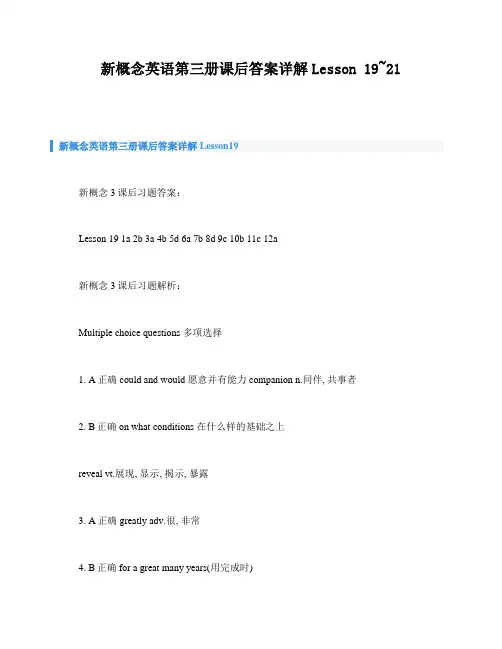
新概念英语第三册课后答案详解Lesson 19~21 新概念英语第三册课后答案详解Lesson19新概念3课后习题答案:Lesson 19 1a 2b 3a 4b 5d 6a 7b 8d 9c 10b 11c 12a新概念3课后习题解析:Multiple choice questions 多项选择1. A正确 could and would 愿意并有能力 companion n.同伴, 共事者2. B正确 on what conditions 在什么样的基础之上reveal vt.展现, 显示, 揭示, 暴露3. A正确 greatly adv.很, 非常4. B正确 for a great many years(用完成时)5. D正确6. A正确 reaction n.反应, 反作用根据语法规则:主语是ambition, duty, goal, hope, idea, intention, mistake, plan, policy, purpose, reaction, suggestion等名词的时, 句子的表语必须是to不定式短语, 该不定式短语是说明其内容的。
-- His purpose in life was to seek truth instead of money.-- Our plan is to make better use of this material.7. B正确 for fear + of/that-- They are working hard for fear that they should fail.= They are working hard for fear of failure. afraid for 侧重点表示:为...感到担心, 害怕失去-- The parents are often are afraid for their children. 父母常为孩子担心。
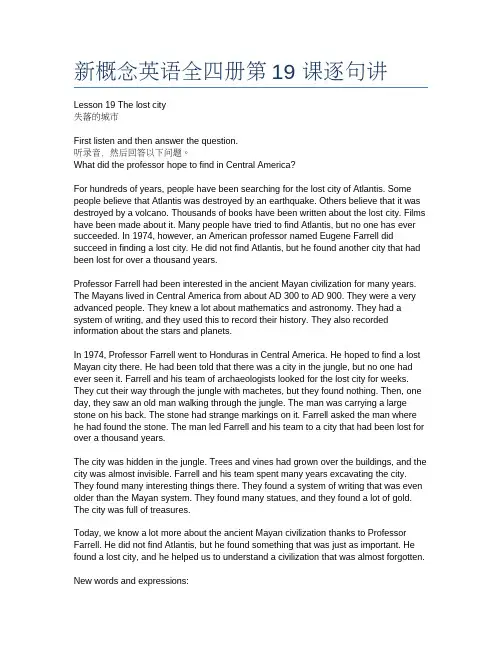
新概念英语全四册第19 课逐句讲Lesson 19 The lost city失落的城市First listen and then answer the question.听录音,然后回答以下问题。
What did the professor hope to find in Central America?For hundreds of years, people have been searching for the lost city of Atlantis. Some people believe that Atlantis was destroyed by an earthquake. Others believe that it was destroyed by a volcano. Thousands of books have been written about the lost city. Films have been made about it. Many people have tried to find Atlantis, but no one has ever succeeded. In 1974, however, an American professor named Eugene Farrell did succeed in finding a lost city. He did not find Atlantis, but he found another city that had been lost for over a thousand years.Professor Farrell had been interested in the ancient Mayan civilization for many years. The Mayans lived in Central America from about AD 300 to AD 900. They were a very advanced people. They knew a lot about mathematics and astronomy. They had a system of writing, and they used this to record their history. They also recorded information about the stars and planets.In 1974, Professor Farrell went to Honduras in Central America. He hoped to find a lost Mayan city there. He had been told that there was a city in the jungle, but no one had ever seen it. Farrell and his team of archaeologists looked for the lost city for weeks. They cut their way through the jungle with machetes, but they found nothing. Then, one day, they saw an old man walking through the jungle. The man was carrying a large stone on his back. The stone had strange markings on it. Farrell asked the man where he had found the stone. The man led Farrell and his team to a city that had been lost for over a thousand years.The city was hidden in the jungle. Trees and vines had grown over the buildings, and the city was almost invisible. Farrell and his team spent many years excavating the city. They found many interesting things there. They found a system of writing that was even older than the Mayan system. They found many statues, and they found a lot of gold. The city was full of treasures.Today, we know a lot more about the ancient Mayan civilization thanks to Professor Farrell. He did not find Atlantis, but he found something that was just as important. He found a lost city, and he helped us to understand a civilization that was almost forgotten. New words and expressions:Atlantisn.亚特兰蒂斯(传说中的失落城市)volcanon.火山Mayanadj.玛雅(人)的;n.玛雅人civilizationn.文明mathematicsn.数学astronomyn.天文学recordingn.记录archaeologistn.考古学家junglen.丛林macheten.砍刀markingn.标记invisibleadj.看不见的excavatev.挖掘statuen.雕像n.财宝thanks to由于,幸亏Phrases and expressions:短语和表达方式search for寻找be interested in……对……感兴趣感兴趣cut one’s way through开路,穿过lead sb. to带领某人去be full of充满just as正如Grammar points:语法要点1. The present perfect tense现在完成时The present perfect tense is used to talk about past actions or events that have a connection with the present. It is formed with the present tense of the verb ‘have’ and the past participle of the main verb.现在完成时用于谈论与现在有联系的过去的行为或事件。
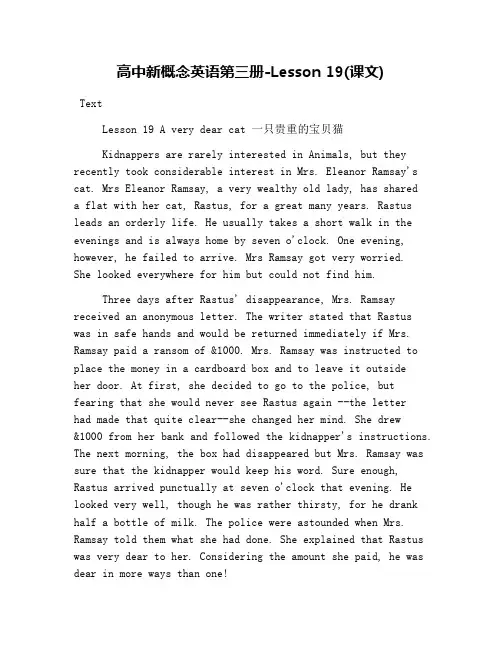
高中新概念英语第三册-Lesson 19(课文)TextLesson 19 A very dear cat 一只贵重的宝贝猫Kidnappers are rarely interested in Animals, but they recently took considerable interest in Mrs. Eleanor Ramsay's cat. Mrs Eleanor Ramsay, a very wealthy old lady, has shareda flat with her cat, Rastus, for a great many years. Rastus leads an orderly life. He usually takes a short walk in the evenings and is always home by seven o'clock. One evening, however, he failed to arrive. Mrs Ramsay got very worried.She looked everywhere for him but could not find him.Three days after Rastus' disappearance, Mrs. Ramsay received an anonymous letter. The writer stated that Rastus was in safe hands and would be returned immediately if Mrs. Ramsay paid a ransom of &1000. Mrs. Ramsay was instructed to place the money in a cardboard box and to leave it outsideher door. At first, she decided to go to the police, but fearing that she would never see Rastus again --the letterhad made that quite clear--she changed her mind. She drew&1000 from her bank and followed the kidnapper's instructions. The next morning, the box had disappeared but Mrs. Ramsay was sure that the kidnapper would keep his word. Sure enough, Rastus arrived punctually at seven o'clock that evening. He looked very well, though he was rather thirsty, for he drank half a bottle of milk. The police were astounded when Mrs. Ramsay told them what she had done. She explained that Rastus was very dear to her. Considering the amount she paid, he was dear in more ways than one!Language points(Attention: The following points are not covered by the video. It is better for you to watch the video or listen to the MP3 first and try to take notes on your own. Then you may check here to get more details. )1,Kidnappers are rarely interested in Animals, but they recently took considerable interest in Mrs. Eleanor Ramsay's cat.rarely = seldomtake interest in= be interested in 一句话中用不同的词组表达同样的意思,是为了避免重复take considerable interest in sth. interest之前能够加上写表示水准的形容词take great interest in = take tremendous interest in = take enormous interest in2, Mrs Eleanor Ramsay, a very wealthy old lady, has shared a flat with her cat, Rastus, for a great many years.share sth. with sb.e.g. I share the room with my friend.for a great many years = for a long time3, Rastus leads an orderly life. He usually takes a short walk in the evenings and is always home by seveno'clock.lead an orderly life 过着很规律的生活orderly 有秩序的,有顺序的,近义词:disciplined 受过训练的, regular 规律的take a walk = go for a stroll = go for a walk 散步4,Three day after Rastus' disappearance, Mrs. Ramsay received an anonymous letter.after能够和名词搭配 e.g. three days after arrivalan anonymous letter 匿名信5,The writer stated that Rastus was in safe hands and would be returned immediately if Mrs Ramsay paid a ransom of &1000.state 非常正式的声明in safe hands 在可靠的人手中,意指“很安全”6,Mrs. Ramsay was instructed to place the money in a cardboard box and to leave it outside her door.be instructed to do sth. 受指示做某事e.g. The journalist was instructed to obtain the so-called important statistics.7, At first, she decided to go to the police, but fearing that she would never see Rastus again --the letter had made that quite clear--she changed her mind.fearing 现在分词做原因状语make it clear to sb. thate.g. The teacher has made it clear to us that we must read English aloud every day.8, The next morning, the box had disappeared but Mrs. Ramsay was sure that the kidnapper would keep his word.keep his promise= keep his promise 遵守承诺word 表示诺言时,要采用单数形式相关词组:break his word 食言;go back on one's word 食言give sb. one’s word 向某人保证; as good as one's word 表示守信用,侧重点在于强调一个结果e.g. I give you my word that I will return your money. 我保证我会把钱还给你。



New concept English Lesson 19A very dear cat一条昂贵的猫dear,宝贵的;珍视的;昂贵;价格高Why was Rastus 'very dear' in more ways than one?为什么Rastus不止一方面很贵重?in more ways than one,不止一方面Kidnappers are rarely interested in animals,绑匪现在很少对动物有兴趣kidnapper,绑匪but they recently took considerable interest in Mrs. Eleanor Ramsay's cat.但他们最近对Eleanor Ramsay夫人的猫有相当大的兴趣take interest in,对……感兴趣considerable,相当多(或大、重要等)的Mrs. Eleanor Ramsay, a very wealthy old lady,Eleanor Ramsay夫人,一个很富裕的老夫人wealthy,富裕的has shared a flat with her cat, Rastus, for a great many years.和她的猫,Rastus,住在一间公寓里,已经很多年了share,共有;合用;共享share with,合伙;合住flat,一套房间;公寓;单元房Rastus leads an orderly life.Rastus,过着有规律的生活lead,过着(某种生活)He usually takes a short walk in the evenings and is always home by seven o'clock. 他通常在晚上走一小段路,并且在7点之前回家be home,回家by,在……之前One evening, however, he failed to arrive.然而,一天晚上,他没有回来fail to,未能Mrs. Ramsay got very worried.Ramsay夫人非常着急get worried,着急She looked everywhere for him but could not find him.她到处找他,但是找不到look for,寻找Three days after Rastus' disappearance, Mrs. Ramsay received an anonymous letter.Rastus失踪后的第三天,Ramsay夫人收到一封匿名信anonymous,匿名的The writer stated that Rastus was in safe hands and would be returned immediately if Mrs. Ramsay paid a ransom of $1,000.写信人声称Rastus得到妥善照顾,并且将立刻放回,如果Ramsay夫人支付1000英镑的赎金的话state,声称in safe hands,得到妥善照顾的;由可靠的人保护(或保管)的ransom,赎金Mrs. Ramsay was instructed to place the money in a cardboard box and to leave it outside her door.Ramsay夫人被命令把钱放在纸箱里,并且把纸箱放在门外cardboard,纸箱At first she decided to go to the police,开始,她决定报警go to the police,报警but fearing that she would never see Rastus again –但是害怕再也见不到Rastusthe letter had made that quite clear –信里说的很清楚make sth. clear,把……交代清楚了she changed her mind.她改变了主意She withdrew从银行取款 $1000 from her bank and followed the kidnapper's instructions.她从银行取了1000英镑,按照绑匪的要求做了The next morning, the box had disappeared but Mrs. Ramsay was sure that the kidnapper would keep his word.第二天早上,纸箱不见了,但是Ramsay夫人相信绑匪将信守诺言keep ones word,信守承诺Sure enough, Rastus arrived punctually at seven o'clock that evening.果然,Rastus那天晚上7点钟准时到家Sure enough,果然punctually ,准时地He looked very well, though he was rather thirsty, for he drank half a bottle of milk. 他看上去很健康,尽管他有点渴,因为他喝了半瓶牛奶well,adj.,健康的,身体好的thirsty,口渴的The police were astounded when Mrs. Ramsay told them what she had done.当Ramsay夫人告诉警察她都做了一些什么时,他们很被惊到了astound,使震惊She explained that Rastus was very dear to her.她解释说Rastus对她来说很珍贵Considering the amount she paid, he was dear in more ways than one!考虑到她支付的钱数,他的珍贵有双重含义(猫本身对老太太很珍贵,花了1000镑很昂贵)。
新概念英语第三册 1-20 课后作文标准答案NCE 2010-11-19 14:55:12 阅读580 评论1 字号:大中小订阅Lesson 1 A puma at largeKey to CompositionA possible answerMRS. Stone had spent the whole morning picking blackberries in the countryside near her home. It was nearly lunch time, so she decided to return home for lunch. She was just picking up her basket when she heard a noise in the bushes. Then she saw an animal which looked like a cat. She knew it was not a cat because it was so large. The animal suddenly turned round to look at her and she thought it was going to come towards her and perhaps attack her. She dropped her basket and screamed loudly. Hearing the sound , the animal disappeared into the bushes, after which Mrs. Stone picked up her basket and ran all her the way home. She told her neighbours that she had seen a puma in the countryside, but they did not believe her. She also telephoned the police but they didn’t believe her either. (148words)Lesson 2 Thirteen equals oneKey to CompositionA possible answerA sticky businessWe were used to hearing our church bell striking the hours in our small village. For as long as anyone could remember, the bell had struck the hours day and night. However, one night the church bell remained silent and the next morning we saw that the clock had stopped at exactly one a. m. Our clock was clearly damaged, but no one could explain how this had happened.Armed with a torch, our vicar climbed into the church tower to see what was going on. He heard a loud buzz as he went towards t clock and in the torchlight he found it had been invaded by bees. He was lucky they didn't sting him! He shone his torch into the great bell and saw that it was full of wax and honey. No wonder it wasn't working!A bee keeper was called in to deal with the situation. He immediately removed the queen bee to one of his bee hives and the other beesfollowed. The clock was cleaned and was soon working again. We not only enjoyed hearing it strike the hours day and night, but we enjoyed eating the honey as well. (195words)Lesson 3 An unknown goddessKey to CompositionA possible answerAfter walking round the ancient city, the archaeologist discovered an ancient temple. This temple had obviously been a place of worship because it contained a sacred room. On entering the sacred room, the archaeologists found the clay fragments of fifteen statue, each of which was a goddess which had once been painted. After this, workmen began digging and soon discovered the head of a state among remains dating from the fifth century B. C. They also found the body of this statue among remains from the fifteenth century was a modern-looking woman. She had her hands on her hips and she was wearing a full-length skirt. Although the archaeologists tried very hard to identify her, they were unable to find out her name. (143words) Lesson 4 The double life of Alfrde BloggsKey to CompositionA possible answerNearly caughtOne morning Alf and three other dustmen were collecting rubbish in Merton Street and they stopped outside Mrs. Frost’s house.Thought Alf didn’t know it, his wife was visiting Mrs. frost at the time. She and Mrs. Frost were old friends, though Mrs. Frost had never met Alf. Alfe was just getting out of the dustcart to go into Mrs. Frost’s backyard when he saw his wife leaving Mrs. Frost’s house. He quickly returned to the dustcart and hid in the driving cabin. While he was hiding, his fellow dustmen helped him by collecting Mrs Frost’s rubbish. Meanwhile, Alf’s wife and Mrs. Frost talked on the doorstep. It looked as though their conversation would never end!At last Mrs. Bloggs said goodbye to Mrs. Frost. She waved to one of the dustmen whom she recognized and she went towards the dustcart to greet him. The dustman waved back and gave her a big smile asthe dustcart drove off. Mrs Bloggs stood on the pavement and watched the dustcart disappear down the street. Then she began to walk home. ”It’s all right, Alf, ”his friend said. ”She can’t see you now. ”“Thanks, Jim, ”Alf said. ”That was a lucky escape!”(200words)Lesson 5 The factsKey to CompositionA possible answerThe journalist counted the number of steps as he wearily climbed up to the high wall surrounding the president's palace. On arriving at the main gate, he sat down to get his breath back. He then produced a tape measure in order to measure the wall. While he was busy measuring the wall, a policeman approached him and asked him what he was doing. Though the journalist explained he was a reporter and his editor had asked him to find out the exact height of the wall, the policeman refused to believe him. He was arrested and sent to prison because the police thought that he might be a spy or might even want to assassinate the president When the journalist in s isted he was innocent, he made things worse for himself. This proved to the police that the man certainly was guilty and deserved to stay in prison indefinitely.(149 words)Lesson 6 Smash-and-grabKey to CompositionA possible answerThey got awaySeeing the thieves' car join the traffic on Piccadilly, Mr. Taylor took a taxi and followed them. The taxi driver drove at full speed when Mr. Taylor told him what had happened.There wasn't too much traffic at this time of the morning so there was a mad chase through the streets of London. For a short time, the thieves' car was on the wrong side of the road and hit another car, but it did not stop. Two policemen in a police car watched in amazement as the two vehicles went past, both breaking the speed limit. Lights onand horn blaring, the police car chased both the speed i ng cars. Mr. Taylor's taxi stopped when the traffic lights turned red. The thieves ignored the traffic lights and got away. Meanwhile, the police caught up with the taxi at the traffic lights and the taxi driver was charged with speeding. They refused to let the driver off, even though Mr. Taylor carefully explained the situation.However, the police informed another police car of the chase and ten minutes later the thieves' car was found abandoned in a side street. The thieves had escaped on foot and disappeared among the crowd. (200 words)Lesson 7 Mutilated ladiesKey to CompositionA possible answerJane opened the oven door and saw that her meal was ready to serve. She took the food out of the oven and in doing so, noticed something strange inside the oven which she couldn’t recognize. So she went to find John and told him about it. In dismay, John quickly explained that he had put his wallet containing the day’s takings into the oven for safekeeping. They both rushed to the oven and saw that the money had been destroyed. At first, they didn't know what to do. John wanted to throw the money away, but Jane wouldn't let him. "It's best not to disturb the wallet" Jane said. "You can see all the money is there, even if it has been destroyed. " Jane told John to go and see his bank manager for advice, so the next day John took the wallet andashes to the bank. (150words)Lesson 8 A famous monasteryKey to CompositionA possible answerRescueOne very cold morning, a monk took two St. Bernard's dogs out for exercise. He immediately noticed that the dogs were very restless. Suspecting a traveler might be in difficulty, the monk returned to the monastery to organize a search party.The two dogs led four monks through the snow. Two of the monks pulled a sledge behind them, in case they needed it. There had been very high winds the previous night, but now everything was still and visibility was bad because there was a heavy fog. Moreover, the temperature had fallen to -20". The dogs led the monks towards the Pass and as the monks got near, they heard cries in . the distance. The dogs soon found a man who was trapped under the snow and immediately dragged him out. The man was alive, but frozen stiff. The monks strapped him to the sledge and took him back to the monastery.The man was unconscious, but he soon recovered in the warm atmosphere of the monastery where he was given plenty of hot drinks and food. When the traveler was able to speak, the monks listened with interest as he told them what had happened the previous night. (200 words) "Lesson 9 Flying catsKey to CompositionA possible answerHuman beings like to keep dogs and cats. Dogs are submissive and faithful to their master s, but cats like to be independent. Cats are especially lovable when they are still kittens. As kittens they like to play by chasing anything that moves. That's how they learn to hunt mice, birds, insects and other small creatures. A lot of people keep cats so they can have a pet. As kittens grow into cats, they like to stay indoors. They like regular meals and enjoy sleeping in front of a nice fire. However, they also like going out. During the day time and at night they like to go huntin g. Sometimes during the night they have fights with other cats. Cats are very clean animals. You often see them washing themselves. Human beings are fascinated by their behaviour because cats are domestic animals, while at the same time they enjoy their independence. (80 words)Lesson 10 The loss of the TitanicKey to CompositionA possible answerAbandon shipThe Titanic began to sink, slowly at first. The order to abandon ship was unexpected, so passengers and crew were completely un-prepared. It was the middle of the night. Some people were asleep in their cabins. Others were on deck admiring the brilliant night sky and the giant icebergs rising above them. Others were eating and dancing in the wonderful ballrooms on the ship.The immediate effect was panic and confusion. People began rushing in all directions, wondering what So do next. The cold was in describable and many passengers were still in their night clothes. Members of the crew came up from below and began to lower the life-boats. It was a case of women and children first, but it soon became obvious that there weren't enough lifeboats for everyone, so people jumped overboard into the freezing water in order to save their lives. Some of those swimming in the water struggled to get into the life-boats, but most of them were already full.The Titanic sank rapidly, carrying many people down with it. There were cries of despair from people in the water as they watched the lifeboats moving away and were left to drown in the icy ocean. (200 words)Lesson 11 Not guiltyKey to CompositionA possible answerWhen the Customs Officer asked the traveller if he was carrying anything valuable, the man said that he had nothing to declare.The Officer asked the man to open his suitcase. Although the case contained only a suit and some dirty clothes, it was very heavy. This made the Customs Officer suspicious, so he removed all the clothes from the case. The case was soon empty and when the Officer lifted it, he found that it was still very heavy. The Officer examined the case carefully and saw that the bottom was very shallow. He pressed the base hard and removed the bottom part of the case which contained a quantity of emeralds and other precious stones. While the Offi c er was looking at an emerald, the man tried to escape. For a moment theman disappeared among the passing holiday travellers, but he was soon caught and placed under arrest. (150words)Lesson 12 Life on a desert islandKey to CompositionA possible answerShipwreckedThe ship went down and everyone was drowned. I was the only one who managed to jump into the sea. I clung to a plank in the water for several hours till I was washed up on a desert island.I slept on the beach for a very long time — I can't remember how long. When I woke up, I was hungry and thirsty, so I decided to explore the island. It was uninhabited, but I found plenty of fruit which had fallen from the trees. I lived on coconuts and pineapples and there was plenty of fresh spring water. I tried to hunt wild animals with my bare hands(small pigs and other creatures), but I failed to catch anything. So I spent my days swimming in the warm clear water and lying in the sun.One afternoon while I was lying on the beach as usual, I saw a boat on the horizon. I signaled with my while shirt and shouted as loudly as I could. Fortunately, someone on the boat saw me and I was rescued. Of course, I was pleased to get back to civilization, but 1 was very sorry to leave this island paradise. (200 words)Lesson 13 "It's only me"Key to CompositionA possible answerMrs. Richards immediately went upstairs and took off her costume . She felt sorry for the poor man from the Electricity Board, but at die same time she was rather amused. Suddenly, there was a knock at the front door and Mrs. Richards opened it at once. electricity man had returned, accompanied by a policeman, so she invited both in. The man told Mrs. Richards that he had tried to reader metre and that there was a ghost in the storeroom. Though Mrs. Richards explained that she had dressed up as a ghost, he refused to believe her. Shetold him to open the storeroom door, but he was too frightened, so she opened it herself. While the electricity man and the policeman were looking for the ghost in the storeroom, Mrs. Richards fetched her costume. She showed it to both men and only then did they believe her. (150 words)Lesson 14 A noble gangsterKey to CompositionA possible answerHawkwood defeatedNews that Hawkwood and his men were approaching caused panic among villagers who prepared to defend their farms. Hawkwood had a bad reputation among farmers because they knew he would not hesitate to kill them and to bum their farms.The farmers fought very hard, even though they were poorly armed. With their sticks and spades, they were no match for Hawkwood's well-armed soldiers who had horses, swords and bows and arrows. During the battle, a great many farmers were killed. After Hawkwood destroyed their farms, he sent a message to the prince of the city-state demanding a large amount of protection money. He said that if this money was paid, he would go away and cause no more trouble. However, if it wasn't paid, he would invade the city. To Hawkwood's amazement, this demand was refused, so he and his men invaded the city. As a result, many buildings were destroyed and thousands of people were killed, including quite a few of Hawkwood's soldiers.The city people fought very hard until Hawkwood and his men were finally driven off. Because the city people defended themselves so well, Hawkwood never attacked them again. He and the prince even became friends. (200words)Lesson 15 Fifty pence worth of troubleKey to CompositionA possible answerI was walking along the street when I saw a crowed ahead of me. Icould hear people shouting and making a noise.On arriving at the scene, I saw a small boy on the pavement with his arm in a drain cover.A lady carrying a large bar of soap and saucepan of water knelt down beside the boy.She asked the boy if he was in pain and he said he wasn’t.Then she rubbed his arm with butter, but he couldn’t get it free.Meanwhile, someone had telephoned the fir brigade.The boy had begun to cry , but when he saw the firemen, he cheered up. At first, the firemen decided to cut through the drain cover, but they changed their minds and rubbed the boy’s arm with a special type of grease. The boy was soon free and though his arm hurt, he was smiling. (150 words)Lesson 16 Mary had a little lambKey to CompositionA possible answerNot so blackDimitri was surprised to find that the lamp had turned white. He took a close look at and recognized it as his own.This discovery immediately led to an angry scene between Dimitri repeated his accusation that Aleko had stolen the lamb, but Aleko still denied any theft. During the violent argument, Dimitri said the rain had proved that the lamb had been dyed black and he recognized it immediately as the one he had given to his wife. When Aleko finally admitted he had stolen the lamp. Dimitri called the police. Aleko was arrested and Dimitritook his lamb home.The story caused a lot of excitement in the village. The villagers didn’t often have the opportunity to talk about such important event and they were greatly amused by what had happened. Some thought Aleko had been very clever. Others thought he had been extremely stupid. Others said God had sent the rain to punish Aleko for his crime and to prove he was a thief. They discussed the event at great length for a long time, as there wasn’t much else to talk about in a village where nothing much ever happened.(199 words)Lesson 17 The longest suspension bridge in the wordKey to CompositionA possible answerThe bridge I know best is called the Sydney Harbour Bridge. It joins either side of Sydney Harbour. From far away it looks like a great arch, but when you get near, you can see a great deck under the arch. It is made of steel and supported by two towers. If you stand on the bridge early in the morning, you can see the Parramatta River to the west and the open sea to the east. At this time everything is quiet. During the day, however, the harbour becomes busy with small boats and large ships moving in all directions. I enjoy standing on the bridge at night when you see the magnificent Opera House looking like a great sailing ship. In the darkness you can see the city lights. In the stillness the traffic and the movement of the sea are the only sounds that can be heard. (150 words)Lesson 18 Electric currents in modern artKey to CompositionA possible answerAn interesting exhibitionRecently I went to the Royal Academy in London to see the summer exhibition. The work of many artists was on display and the ex h ibition aroused a lot of public interest. Crowds of people filled the galleries.The pictures were, with a few exceptions, mainly by relatively unknown artists. Many of them were traditional pictures of landscapes and portraits. I particularly liked a picture of an old farmhouse by a stream with a few sheep in a field. The strangest picture I saw was an untitled abstract painting by a well-known modem artist. It consisted of swirls of different colours which had been rubbed into the canvas with the artist's fingers. The picture looked a mess, but was also very effective, attracting a lot of comment.I couldn't help overhearing what people said, things like "I could painta picture like that with my eyes shut" or "Look how perfect the sunset is in that painting. I'd love to own a picture like that", and so on. There is no doubt it was an excellent exhibition because there were so many different styles on display. There was something to suit everyone in it only if you could afford the high prices! (200 words)Lesson 19 A very dear catKey to CompositionA possible answerIn a bar one night, Mr. X was talking to a workman who told him that he often worked in Mrs. Ramsay's flat The workman added that Mrs. Ramsay was wealthy and she lived alone with her cat. Everyday, Mr. X stood outside Mrs. Ramsay's block of flats. As the cat took a short walk every evening, he saw that it had regular habits, He found out as much as he could about Mrs. Ramsay and learnt that she loved this cat very much. One evening, as the eat was leaving the block of flats, he kidnapped it He took the cat to a secret address- During the next three days, he walked past Mrs. Ramsay's flat on several occasions and noticed that no other cat ever appeared. Now he was sure he had the right cat, so he wrote a letter in which he stated his demands. (150 words)Lesson 20 Pioneer pilotKey to CompositionA possible answerMy flight across the ChannelIt was early morning. I looked around, but there was no sign of Latham, sol decided to goons test flight first. At 4. 15, I took off and flew over Calais for fifteen minutes. When I landed there was still no sign of Latham. At 4. 45 I took off again. This time I was determined to fly across the Channel. When I looked down there was no sign of the ship below, which was supposed to be following me, I suddenly felt alone and was worried whether I was flying in the right direction. All I could see was sea and sky. I could feel the high winds against the plane and the engine got very hot. Fortunately, it began to rain and the rain cooled my engine. Suddenly, I could see land ahead. Dover!I flew over Dover, looking for somewhere to land. I saw a field below and brought the plane down. I was still sitting in the cockpit, hardly able to believe the flight was so successful — just thirty-seven minutes to crossfrom Calais — when a British policeman arrived. He smiled broadly at me and said, "Good morning!" I smiled back and said, "Bonjour!" (200 words)。
Lesson 19 Avery dearcat一条贵重的宝贝猫Listentothe tape then answer the question below.Why wasRastus 'verydear' in more waysthan one?Kidnappers are rarelyinterested in animals, but theyrecently took conside rable interestin Mrs.Eleanor Ramsay's cat.Mrs.Eleanor Ramsay,a very wealthyold lady, hasshared a flatwithhercat, Rastus, for a greatmanyyears. Rastusleads an orderly life. He usually takes a shortwalk intheevenings andis always homeby seven o'clock. One even ing,however,he failed to arrive.Mrs.Ramsay got very worried. She looked everywhere for him but could notfind him.ThreedaysafterRastus' disappearance,Mrs.Ramsayreceivedananonymous letter.The writer statedthat Rastuswas insafe hands and would be returned immediately ifMrs. Ramsaypaid arans om of £1,000.Mrs. Ramsay was instructedtoplace themoney in acardboard box andto leave itoutside her door. Atfirst, she decide dto go to the police, but fearing that shewouldneversee Rastus again --the letter hadmade thatquiteclear--shechanged hermind. She withdrew£1000fromher bank andfollowedthekidnapper's instructions.The next morning, the box had disappeared but Mrs. Ramsay was surethat thekidnapper would keephis word. Sureenough, Rastus arrived punctuallyat seven o'clock thatevening.Helooked very well though he was ratherthirsty,for he drank halfabottleofmilk. The police were astounded whenMrs.Ramsaytold them what she had done.She explained thatRastuswas very dear toher. Considering the amoun tshe paid, he wasdear in more waysthan one!1.dearadj. (dearer,dearest)1. (~to sb.) lovedby orimportant to sb.亲爱的; 宝贵的;珍视的e.g.(1)他是我最亲密的朋友之一。
He is one of my dearest friends.(2) 他的女儿是他心爱的宝贝。
His daughter is very dear to her.2.(Dear) used at the beginning of a letterbefore thename or title ofth epersonthatyou are writing to(用于信函抬头的名字或头衔前)亲爱的3. [not usuallybefore noun](BrE)expensive;costinga lot of money 昂贵,价格高e.g.现在什么东西都那么贵。
Everything is so dear now.ﻫn.1.used when speakingto sb.you love(常作称呼所爱的人)亲爱的e.g.喝点什么吗,亲爱的?Would you like adrink, dear?adv.(at ahighprice)高价地,昂贵地ﻫe.g.(1) 他的错误使他付出很高的代价。
His errorscost him dear.(2) 贱买贵卖tobuycheap and selldearexclamation[,eksklə'meiʃən] used in expressionsthat showthat youare surprised,upset,annoyed or worried (惊奇,不安,烦恼,担忧等时说)啊,哎呀,糟糕,天哪e.g. 哎呀!我忘了寄信。
Oh dear! I forgot to post the letter. ﻫ2. kidnapper['kɪdnæpə] n. 绑票者;劫持者e.g. 劫持者索要100万元赎金。
The kidnappersare demandingaransom of $ 1 million.kidnap['kidnæp] v.(-pp-) [vn] to take sb away illegally and keep them as a prisoner,especiallyin order to getmoney or sth else for returning them劫持;绑架e.g.两名商人遭恐怖分子绑架。
Twobusinessmenhave beenkidnapped by terrorists.kidnapping (alsokidnap) n.[u, c] 绑架e.g. (1) 他对绑架的指控供认不讳。
He admitted thecharge ofkidnap.(2) 对12名美国公民的劫持thekidnappingof 12 US citizens3.considerable [kən'sidərəbl]adj.(formal)greatin amount, size,importance,etc.相当多(或大、重要等)的e.g.(1)那项工程耗费了相当多的时间和资金。
The project wastedaconsiderable amount oftimeand money.(2)对这栋建筑物的损坏相当严重。
Damagetothe buildingwasconsiderable.considerably adv. (formal)much; a lot非常;很;相当多地e.g.不同的人对睡眠的需要差异相当大。
The need for sleep variesconsiderablyfrom personto person.4.wealthy['welθi]adj.(wealthier,wealthiest)1.rich; havealot ofmoney,possessions, etc.富有的,有钱的,财产多的e.g. 有钱人家a wealthy family2.(the wealthy)n. [pl.] people who arerich富人,有钱人;阔人n. wealth5.在英语中,当名词有多个形容词修饰时,就有它们的先后顺序。
下面的口诀可帮你记住这一先后顺序。
限定描绘大长高,形状年龄和新老;颜色国籍跟材料,作用类别往后靠;“限定词”包括:冠词、物主代词、指示代词、或数词,它位于各类形容词前。
它本身分为三位,即:前、中、后。
前位限定词有all、half、both、such分数和倍数;中位限定词有冠词、指示代词、形容词性物主代词、名词所有格和no、every、each、either、neither、enough、much、以及wh-起首的限定词[what(ever), which(ever), whose]等;后位限定词有基数词和序数词、past、same、many、more、most、few、fewer、fewes t、little、less、least、own、last等,但序数词位于基数词前。
如:both myhands、allhalfhis income等。
“描绘”类形容词表示事物的性质及人们的观点如:beautiful、bad、cold、great等。
“大长高”表示大小、长短、高低等一些词。
表示“形状”的词如:round square等。
“国籍”指一个国家或地区的词。
“材料”的词如:wooden,woolen,stone,silk等。
“作用类别”的词如:medical, college,writingdesk,poli cecar等。
具体应为限定词+描绘类+形状类+时间类+颜色类+出处类+材料类+用途类+作定语的名词、动名词(如girl、boy、man、woman等)6.sharev.1.(~sthwith sb.)tohave orusesth. at the same time as sb.else. 共有,合用e.g.苏和另外三个学生合住一所房子。
Sueshares a house withthreeotherstudents.2. (~sth with sb.)to give some of what youhavetosb. else;tolet sb.usesth.that is yours分享;共享e.g.(1)汤姆把他的巧克力和其他孩子一起分着吃了。
Tomsharedhis chocolate withthe other kids.(2)研讨会是互通信息、交流思想的好场所。
The conferenceis a good place to share informationand exchangeideas.3.~(in) sth./ ~sth. (with sb.) to be equally involved insth. or responsiblefor sth.共同承担,分担e.g.(1) 我努力让孩子们分担家务活。